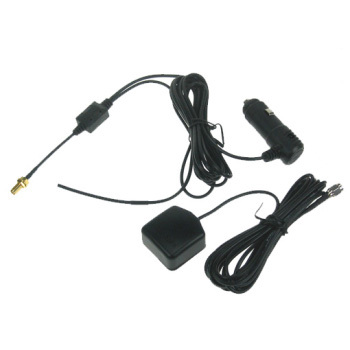I can't see any currently.
Very few GPSs work with IOS devices (Iphone/Ipad) and of those, the very good XGPS150 has to be switch selected so cannot do both while mounted somewhere out of the way.
Maybe the Garmin GLO? But they are not saying anything about it in detail.
I would like one which has an external antenna socket (for a standard 5V 30mA active antenna) and an external power socket (like many old NMEA units) so a decent signal is assured while the unit is tucked away somewhere where it can be neatly powered.
A google just finds loads of posts from me asking this Q over the past year or two 
What would be brilliant would be a bluetooth GPS which can run two BT connections concurrently: IOS and NMEA. Emtac (now defunct) did make a version of their excellent and very common unit (which I've been flying with for best part of 10 years) which supported four BT connections.
The issue, I think, is that none of these IOS-compatible units will drive an IOS device and an Adroid device concurrently.
I don't know. But you could get:
(i) a GPS that sends its signal to one device and use that device to re-broadcast the signal to the other device. You'd have to write custom software on one of the devices though. So why not:
(ii) two GPS devices.
I don't think there is such a GPS unit.
David's suggestion is a cunning one 
However it leaves the issue of how to use an external (rooftop) antenna, with both.
There are GPS re-radiator products such as this

(that one is for a car) and if one of those will work with a standard 5V active rooftop antenna, one could re-radiate the signal inside the aircraft. One could put the GPS re-radiator inside the roof trim.
But then there would be no need for a bluetooth GPS supporting an Ipad because the Ipad GPS would work properly  The only benefit of bluetooth would be that one could use a non-3G Ipad.
The only benefit of bluetooth would be that one could use a non-3G Ipad.
I find the Ipad2 GPS to be almost useless in the TB20, but it worked very well in an SR22 the other day.
I am a bit baffled by the anxiety over antennae: myself am using the simplest of the simplest, a HiTec 204, generally dangling around in my cluttered cockpit (though I try to mind tying it up somewhere high). It rarely receives less than 7 satellites, without any additional antenna, for which it has no provision anyway. Is this good performance due to my flying a tube and rag microlight, perhaps? If so, you have just understood one more advantage of keeping things on the humble side!
Is this good performance due to my flying a tube and rag microlight, perhaps?
Yes, IMHO.
There are however some GPSs which fail to acquire a lock if switched on while already moving at speed (I have had several).
It can also be due to interference from aircraft systems. This is always present; it's just a question of whether it is bad enough.
A year later – still nothing on the market?
I would go with the two-unit solution, if I could find ones that have
I don’t think any IOS GPSs have this, though it is/was fairly common on the NMEA units.
If one forgets the external antenna requirement, one has to mount it/them on the top surface of the instrument panel. That would work, although I do rather like the totally rock solid GPS reception that I get with my ancient EMTAC bluetooth GPS which is fed from a rooftop antenna.
Also, given all these have batteries in them, if you don’t turn it off after each flight, you will be fully cycling the battery with every flight, as well as not having the battery backup during the early part of any flight (because it hasn’t charged yet). Some of the units I have seen have very fiddly switches.
Any GPS-related equipment that does not use NMEA is imho worthless (for that aspect, at least). NMEA is a good, respected, and universally applied standard – anyone not complying with it is playing the dirty game of trying to impose their own invention as a standard. Remember the number of times $soft tried such tricks with networking and internet? Luckily the world decided against them, also because the alternatives they came up with were very poor. I fervently hope the same trick will be refuted again even if this time it comes from a less disrespectable company.
any GPS-related equipment that does not use NMEA is imho worthless
That makes pretty much all certified panel mount GPS worthless 
They usually support “aviation data format”
?? Oops, I never knew there existed such a thing. So we have NMEA, IOS’s homebrew, and this “aviation data format” ?
Who owns/maintains the definition of this last one? I should think a converter wouldn’t be extremely hard to build, around some microcontroller?
That said, I still hold we should refuse to accept one company’s own (and, likely, proprietary) standards, unless they manage to get them generally accepted, as happened with the Centronics parallel printer interface.